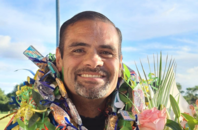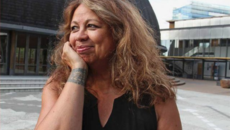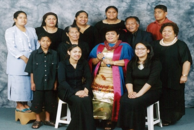Children of the migrant dream - Tagaloatele Peggy Fairbairn-Dunlop
Cover photo: Tagaloatele Peggy's family in Kilbirnie in 1950 just before her older brother Teo was awarded a scholarship in USA. She is the youngest, sitting in the middle.
We are the children of the migrant dream - that education is the auala to a good job and a better life. However, recent data about Pacific education achievement is indicating quite compellingly that this dream has not been the reality for many Pacific families. This is evidenced also in New Zealand’s Poverty Report (2021) in which one in four Pacific families have been classified as living in poverty. These data are hugely concerning.
When our parents migrated to New Zealand in the 1940s, we were the only Samoan /Pacific children at our school and there was one Maori family. Faith and family played a central role in our home life as did the values of faaaloalo, usitai, fealofani and tautua (service) to our aiga here and in the homelands because ‘for those to whom much is given, much is expected’. In those early days it was like we knew every Samoan family in Wellington and, New Zealand. Our get togethers were times of sharing news from home, joking, and loads of laughter and singing to the soft strumming of guitar, uke and mandolin - sometimes our uncle Tupuola Sepe would get out his steel guitar.

Like many others, our life was marked by tupe sent home (and an assortment of chiming clocks for the church) and mum sitting at the table after work every night writing letters home. In the morning she would ask as we ran out the door ‘are you going past the Post Office today’? And of course, we were. Our parents were strict. They expected us to do well at school and we had a clear-cut set of family rules: listen to the teachers, don’t get into trouble. come straight home after school (to the care of our older brothers and sisters) and, never go to other people’s homes (you’ll be blamed if something goes wrong).
We never ever considered questioning our parents’ words or actions and we certainly never questioned our teachers who, we believed, held the knowledge needed to succeed at school. As in the fa'aSamoa, we learnt that to question elders or someone of higher status than ourselves was rude and fiasili (acting above ourselves, trying to be clever) and that to do so would bring shame to our family because they had failed to teach us the right behaviours.
As children, we didn’t expect to be included in family discussions either, due to cultural norms which determine who speaks and who is listened to and, what is talked about. I was reminded of these norms when a student told me about his first visit to the homelands. How, while waiting at the airport to travel back to New Zealand, his parents turned and said to him ‘You aren’t coming back with us. You’ll be staying here’. What? Looking back, I came to see that in the fa'aSamoa, to ask a question was regarded and taken to be a criticism against the person (i.e. subjective) rather than a genuine request for more information.

My first real awakening to the power of questioning was when my sixth form geography teacher waved his arms wildly in the air and shouted ‘Don’t just describe what you read. Challenge the texts. That’s what education is about!' That’s when I began to understand that I didn’t have to accept everything I read as truth and that I could and should question – even if only in my head. As a teacher, I also urged my students to question question question. And one replied ‘I wanted to question, but I sat and sat and stewed about it in my head and then when I finally got the courage to ask, it all came out wrong!’.
Uppermost in my mind today is my sadness at the comments I read in education reports which state that Pacific students are invisible in the classroom i.e., don’t talk, don’t ask questions and don’t answer questions. Clearly our students don’t feel comfortable or safe enough to participate in open classroom discussions – fearful of saying something wrong or being laughed at for their language, if not for their ideas?
We can say this blunting of Pacific students’ participation is due to a lack of fit between the way classrooms organise and Pacific cultural norms of correct behaviours. At the same time, it is imperative that we ask, ‘what are Pacific communities doing to address this reported silencing?’ especially given that the freedom to question, listen and respond to other views is not only personally empowering, it is the critical pathway to knowledge building. Bottom line - If we want our children to sit with just as much confidence at village as well as global decision-making forums, then we must rethink our fa'aPacific communication norms and parenting behaviours.

That is what is happening in the PowerUP (Talanoa Ako) As and By Pacific family and community led programme (MOE)
Parents and children attend the PowerUP sessions together and so parents and children are able to watch each other interact with teachers and leaders in group discussions and one on ones. A main finding emerging in the programme talanoaga, is that parents and children are beginning to talk about education together, a practice which has transferred from PowerUP into family homes and communities as well.
Second and a related finding, parents said that they were profoundly moved by the way the PowerUP teachers and other adults talked to children, listened to children’s responses, and urged them to question – when something is not clear and when they have something to say or add to a discussion. While initially the PowerUP parents hadn’t been entirely thrilled about their children having so much voice in this education setting, their views quickly turned to feelings of amazement (and pride) at what they termed the ‘out of the box’ ideas and resilience children demonstrated when they brought their knowledge and ideas into these learning conversations.

Parents also began reflecting on the way they talked to their children as well as their relationships with their children.
Parents said:
I believe before PowerUP I was like narrow minded – closed to only my way of thinking being the only way. It has really opened my eyes: my kids can do it, they are allowed to make mistakes, and they learn from it. It’s their learning journey. I need to stop comparing it to my time at school. It was more about me being scared and trying to protect them more. It wasn’t easy (Parent Talanoa)
[I’m] actually stopping and listening, letting the students and kids know they are worthy. Kids don’t always get it right. Listen to your gut, listen to your kids’ views, it’s not always [just about] what adults are saying. Giving them a chance to tell their story. Giving the attention, thinking of what else you can do [to support them] (Parent Talanoa)
I have changed the way I communicate with my children. I discuss with my children their individual goals and how to achieve their goals (Talanoa profile)

These and other similar comments indicate that a rethinking of fa'aPacific culturally inscribed communication norms and practices is taking place.
Learning to listen, acknowledge and appreciate children’s voices is a challenge to fa'aPacific parenting behaviours. While I have come to realise how directive I was as a parent I am continually reminding myself to listen, hear and know that my children and in turn their children must make and take responsibility for their decisions and choices.

Fetaui is also a Victoria University of Wellington (VUW) graduate and was awarded an honorary PhD by VUW. Her daughter Fiame Naomi, the Prime Minister of Samoa - the first female Prime Minister of Samoa.
The relationship between parents and elders listening to children and acts of physical abuse was a main finding in Samoa’s Tetee Atu family violence programme run by the National Council of Women (NCW).
Parents weekly self reports indicated that much of the physical abuse which occurred within a family was associated with children not obeying their parents’ instructions immediately and without questioning. Drawing on these findings, the Tete'e Atu focus was on parents listening to children and parent-child relationships.




